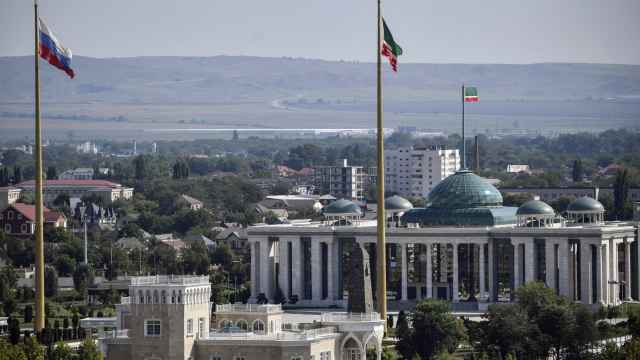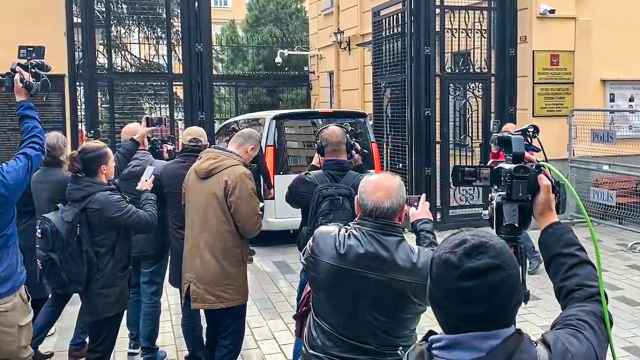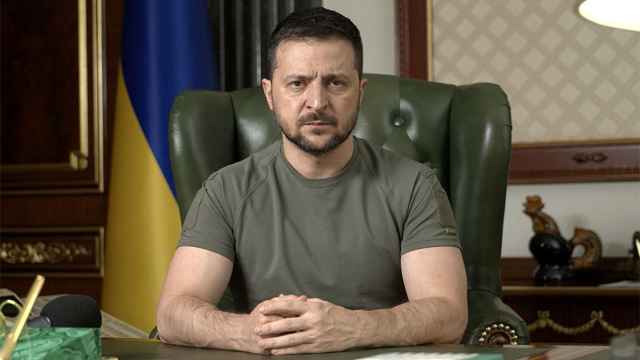A Sept. 9 article in the Financial Times began with the following words: “Listen to Russia’s president and prime minister talk about its most pressing political issue — modernizing its economy — and a significant difference of tone emerges.”
That was just one of many articles to appear in the foreign and domestic press in recent days about the real or perceived differences within the ruling tandem.
We can learn a great deal both from the different statements made by President Dmitry Medvedev and Prime Minister Vladimir Putin and the similarities in their tone. For example, in a Kommersant interview during his road trip from Khabarovsk to Chita, Putin said several times that a fully legitimate method for dealing with the political opposition would be to “beat them upside the head with a truncheon.” When Medvedev visited Voronezh and learned that owners of privatized land had dug up and sold the irrigation pipes that were running across their property, he said: “Their hands should be chopped off for that. It is a crime.”
In comparing these two bloodthirsty statements, the first thing that comes to mind is that Putin has targeted a very narrow segment for clubbing — the Strategy 31 demonstrators, numbering several hundred people, who insist on being able to hold protests wherever they want, and not only where the government permits.
Medvedev was much broader in his attack. He explained his anger over the improper use of the irrigation pipes, saying, “They were laid during Soviet times using the people’s money.” This sounds like a denunciation of the entire process of privatization in the 1990s. If that is the case, tens of thousands of people might be in danger of losing their hands, while former Yukos CEO Mikhail Khodorkovsky should be happy that he was sentenced under Putin’s rule and not Medvedev’s.
The president’s new radicalism has attracted fans from some unexpected camps. For example, liberal journalist and historian Leonid Mlechin recently published an opinion piece in Moskovsky Komsomolets titled, “If Only Somebody Would Be Shot.” This is a quote from Mlechin’s colleague, a liberal professor who believes that heads should roll to punish what he perceives as the authorities’ blatant incompetence in coping with this summer’s wildfires. In contrast, the general public tends to blame the calamity on uncontrollable forces of nature, not on the authoritarian regime. Opinion polls reveal that the public’s shaky confidence in the president and prime minister during the fires has now returned to its previously high levels.
The common understanding in Russia is that democracy is not what the masses think but what liberal professors and their foreign sympathizers want. Is Putin trying to break this custom when he described Russia’s approach to modernization to members of the Valdai Club last week in Sochi by saying, “We don’t need any jumping up or down or sideways or left or right”?
While driving across Siberia, perhaps Putin tried to reinforce his favorite theme by laying flowers at the Norilsk Golgotha memorial dedicated to the victims of Stalinist repression.
Putin once compared himself to Mahatma Gandhi. As this political season gets under way, Putin certainly sounds like him.
Alexei Pankin is editor of IFRA-GIPP Magazine for publishing business professionals.
A Message from The Moscow Times:
Dear readers,
We are facing unprecedented challenges. Russia's Prosecutor General's Office has designated The Moscow Times as an "undesirable" organization, criminalizing our work and putting our staff at risk of prosecution. This follows our earlier unjust labeling as a "foreign agent."
These actions are direct attempts to silence independent journalism in Russia. The authorities claim our work "discredits the decisions of the Russian leadership." We see things differently: we strive to provide accurate, unbiased reporting on Russia.
We, the journalists of The Moscow Times, refuse to be silenced. But to continue our work, we need your help.
Your support, no matter how small, makes a world of difference. If you can, please support us monthly starting from just $2. It's quick to set up, and every contribution makes a significant impact.
By supporting The Moscow Times, you're defending open, independent journalism in the face of repression. Thank you for standing with us.
Remind me later.





